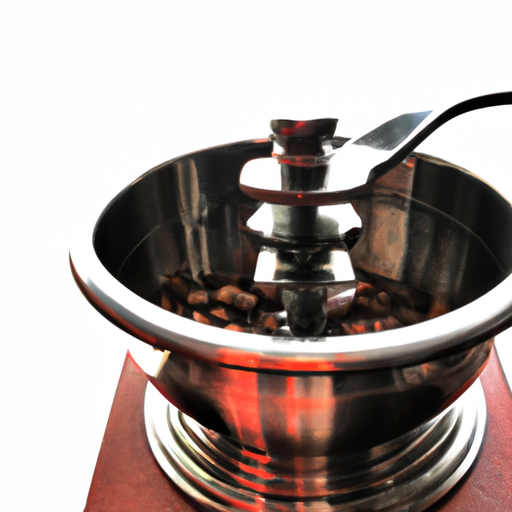Ever had a cup of coffee that was just too bitter to enjoy? If so, you’re not alone. Bitterness in coffee can often overpower the flavors and aromas that make it a beloved beverage. But fear not! In this article, we’re going to share with you eight simple tips that will help you reduce the bitterness in your morning cup of joe. So whether you prefer a bold dark roast or a smooth medium blend, these tips will ensure that you savor every sip without any bitter aftertaste. Get ready to elevate your coffee experience to a whole new level!
Choose the Right Coffee Beans
When it comes to making great-tasting coffee, it all starts with selecting the right coffee beans. The type of beans you choose can greatly affect the overall flavor and bitterness of your brew. For the best results, opt for Arabica beans. Arabica beans are known for their smooth and delicate flavors, making them a popular choice among coffee enthusiasts. On the other hand, Robusta beans tend to have a stronger and more bitter taste, so it’s best to avoid them if you’re looking for a milder cup of coffee. By choosing the right beans, you’re already taking a big step towards reducing bitterness in your coffee.
Avoid Overly Dark Roasts
While some people enjoy the bold and intense flavors of dark roast coffee, it’s important to note that the darker the roast, the more bitter the coffee tends to be. Dark roast coffees are roasted for a longer period of time, which can lead to the development of more bitter flavors. If you’re looking to reduce bitterness in your coffee, opt for medium or light roast beans instead. These roast levels tend to preserve more of the natural sweetness and acidity of the coffee, resulting in a smoother and less bitter cup of joe.
Try Single-Origin Beans
Another way to reduce bitterness in your coffee is to try single-origin beans. Single-origin coffees are sourced from a specific region or even a single farm, allowing you to enjoy the unique characteristics and flavors of that particular area. These beans often have a more distinct and nuanced flavor profile compared to blends, which can help to balance out any potential bitterness. So, the next time you’re in the mood to experiment, give single-origin beans a try and see how they can elevate the taste of your coffee.
Grind Your Coffee Correctly
In addition to choosing the right beans, how you grind your coffee can also greatly impact its flavor. Investing in a burr grinder is key to achieving a consistent grind size, which is essential for optimal extraction and reducing bitterness. Burr grinders allow you to adjust the grind size to your preference, ensuring that the water extracts the coffee evenly and efficiently. For a less bitter cup of coffee, opt for a coarser grind. Finer grounds tend to release more bitterness during extraction, while coarser grounds result in a smoother and milder brew.
Grind Just Before Brewing
To further enhance the freshness and flavor of your coffee, it’s important to grind your beans just before brewing. Coffee grounds have a larger surface area when exposed to air, which can cause them to stale more quickly and result in a more bitter taste. By grinding your beans right before brewing, you’ll be able to capture and enjoy the full aroma and flavor of the coffee. So, resist the temptation to grind your beans in advance and aim for a freshly ground cup of joe every time.
Adjust the Coffee-to-Water Ratio
The ratio of coffee to water is a crucial factor in determining the strength and flavor of your brew. By using the right coffee-to-water ratio, you can reduce the bitterness and ensure a well-balanced cup of coffee. One popular guideline is the Golden Coffee Ratio, which recommends a ratio of 1 to 2 tablespoons of coffee for every 6 ounces of water. However, this ratio can be adjusted according to personal preference. If you prefer a milder cup, try reducing the amount of coffee you use, and if you enjoy a stronger brew, feel free to increase the amount. Don’t be afraid to experiment until you find the perfect balance for your taste buds.
Control Brewing Temperature
The temperature at which you brew your coffee plays a significant role in the extraction process and ultimately affects the flavor. Boiling water is generally too hot for brewing coffee as it can extract more bitter compounds from the beans. Instead, aim for water that is about 195 to 205 degrees Fahrenheit (90 to 96 degrees Celsius). This temperature range is known to extract the optimal flavors from the coffee without extracting excessive bitterness. Using a thermometer or an electric kettle with temperature control can help you achieve the right brewing temperature consistently.
Brew for the Right Amount of Time
The duration of the brewing process also has an impact on the taste of your coffee. Over-extraction is a common cause of bitterness, so it’s important to avoid brewing your coffee for too long. This is especially true for methods that involve steeping the coffee, such as French press or cold brew. Experiment with different brewing times to find what works best for you. Some people prefer a shorter brew time, around 3 to 4 minutes, for a milder flavor, while others may enjoy a longer brew time, up to 5 or 6 minutes, for a stronger cup. Finding the right balance will help you achieve a smoother and less bitter taste.
Get the Brewing Method Right
The brewing method you choose can greatly influence the flavor profile of your coffee. While there are numerous methods to explore, three popular options to consider are pour-over brewing, cold brew, and French press.
Pour-over brewing involves manually pouring hot water over ground coffee, allowing the water to pass through a filter and drip into a cup or carafe. This method offers control over the brewing process and can result in a cleaner and less bitter cup of coffee.
Cold brew is a method where coffee grounds are steeped in cold water for an extended period of time, typically 12 to 24 hours. The slow extraction process in cold water helps to reduce bitterness and results in a smoother and less acidic cup of coffee.
French press brewing involves immersing coffee grounds in hot water and then pressing a plunger to separate the grounds from the liquid. This method produces a fuller-bodied coffee with more oils and flavors, which can help balance out any potential bitterness.
Give these different brewing methods a try and see which one suits your taste preferences and helps to reduce the bitterness in your coffee.
Use Fresh and Filtered Water
The quality of the water you use can have a significant impact on the taste of your coffee. Using freshly drawn cold water is key to ensuring the best possible flavor. Avoid using hot water from the tap as it can contain impurities and affect the taste. Fresh water is generally more oxygenated, which helps to extract the desirable flavors from the coffee beans.
If your tap water has a strong taste or odor, consider filtering it before brewing your coffee. A simple water filter or a filtering pitcher can help remove any impurities and provide a cleaner base for your coffee. This can lead to a more enjoyable and less bitter cup of coffee.
Avoid Storing Coffee Improperly
How you store your coffee can greatly affect its freshness and flavor. To preserve the flavor and reduce bitterness, it’s important to keep your coffee beans or grounds in a dark and cool place. Exposure to light, heat, and air can accelerate the oxidation process and lead to stale and bitter coffee. Store your coffee in an airtight container away from direct sunlight and heat sources, such as the countertop or near the stove.
If you buy whole beans, it’s best to grind them just before brewing to maintain the freshness and flavor. Ground coffee has a larger surface area and is more prone to oxidation, which can result in a more bitter taste. By following proper storage practices, you can ensure that your coffee remains fresh and delicious, minimizing any potential bitterness.
Consider Adding Ingredients to Mask Bitterness
If you’ve tried various brewing techniques and still find your coffee to be too bitter, don’t worry! There are a few ingredients you can add to your coffee to help mask any unwanted bitterness.
A pinch of salt is a common trick used by baristas to counteract bitterness in coffee. Salt can help to enhance the sweetness of the coffee while reducing bitter flavors. Start by adding a tiny pinch and gradually increase it until you find the right balance.
Another option is to experiment with different flavorings like cinnamon, cocoa, or vanilla. These ingredients can add a subtle sweetness and enhance the overall flavor of your coffee, helping to distract from any bitterness that may be present.
Remember, taste is subjective, so feel free to get creative and tailor your coffee to your personal preferences. Just a small adjustment might be all it takes to transform a bitter cup into a delightful experience.
Experiment with Different Brewing Devices
If you’re still struggling to find the perfect brewing method to reduce bitterness in your coffee, don’t be afraid to explore different brewing devices. Each device has its own unique characteristics that can affect the final flavors.
One option to consider is an Aeropress. The Aeropress is a versatile and compact brewing device that uses air pressure to extract the flavors from the coffee grounds. It allows for quick and customizable brews, which can help you fine-tune the extraction process and minimize bitterness.
Another popular choice is an espresso machine. Espresso tends to have a bolder and more concentrated taste, but if brewed properly, it doesn’t have to be excessively bitter. With an espresso machine, you have control over various factors such as grind size, water temperature, and extraction time, allowing you to tailor your brew to your desired taste.
If you’re a fan of strong coffee, consider trying a Moka Pot. This traditional Italian brewing device produces rich and robust coffee with a unique depth of flavor. By adjusting the brewing time and grind size, you can achieve a well-balanced and less bitter cup of coffee.
Don’t be afraid to explore different brewing methods and devices until you find the one that brings out the best flavors in your coffee.
In conclusion, reducing bitterness in your coffee is a matter of selecting the right beans, grinding them correctly, adjusting the coffee-to-water ratio, controlling the brewing temperature and time, using fresh and filtered water, storing the coffee properly, and experimenting with various brewing methods and devices. By following these tips, you can enjoy a smoother and more flavorful cup of coffee that is tailored to your taste preferences. So, next time you reach for a cup of coffee, remember these friendly tips to enhance your brewing experience and savor every sip.


